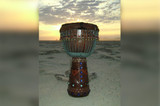Wood vs. Fiberglass Bongos
For the professional or hobbyist bongo drummer, selecting the right drums for the gig or circle may be more than a matter of personal preference. Most people shop for bongo drums based on price, availability, looks, and ultimately, the sound the bongos produce. Since there are major differences in the performance needs between stage drumming, studio drumming and drum circle drumming, choosing the best drum for the event is one of the most important decisions a bongo drummer can make.
Originally bongos were made from wood with animal skin heads, and these same types of bongos are available today. Wood drums produce a warm, natural tone when struck, and this type of sound holds true for bongo drums, as well. Wooden bongos are an excellent choice for drum circles, as the tone blends better with other natural drums that tend to gather during these events. While it is true that the different types of wood used to make a bongo drum can produce variations of these warmer tones, when compared to other materials like fiberglass, the sound of wood bongos is definitely more natural and earthy. For studio recording, the wooden bongo may produce a better sound, adding depth to the recording through the ancestral tones of the drums.
Fiberglass drums, on the other hand, are a great choice for stage performances and drumming with instruments that are amplified. The tone of a set of fiberglass bongo is crisper and more resonant than what is produced from wooden bongos, which also make them great drums for the beginner bongo player as well as the live performer.
Although both materials are very durable, wooden bongos are more likely to scratch, especially when traveling. Wood is also more affected by weather conditions like humidity, temperature and direct sunlight than fiberglass.
Bongo drums come in as many different styles and types as the drummers who play them. Whether a bongo drummer chooses a set of drums for a professional stage performance, a studio recording or a community drum circle, the difference in sound quality may be the deciding factor when deciding between wood or fiberglass bongos. No matter the material preference, always be sure to listen to the tones that the bongos make before buying to be sure that beyond the venue, the bongo drummer is satisfied with the sound.
Recent Posts
-
What is the Best Size Djembe for Beginners?
If you're new to the world of percussion and interested in learning the djembe, you're in for a t …16th Jul 2024 -
The Benefits of Becoming a Drumming Teacher: Transforming Passion into Profession
Why become a drumming teacher? Becoming a drumming teacher is an excellent way to share your pas …22nd May 2024 -
What Makes the Djembe Drum a Spiritual Instrument in African Music?
Origin and history of the Djembe drum The Djembe drum originates from West Africa and holds sign …16th May 2024



